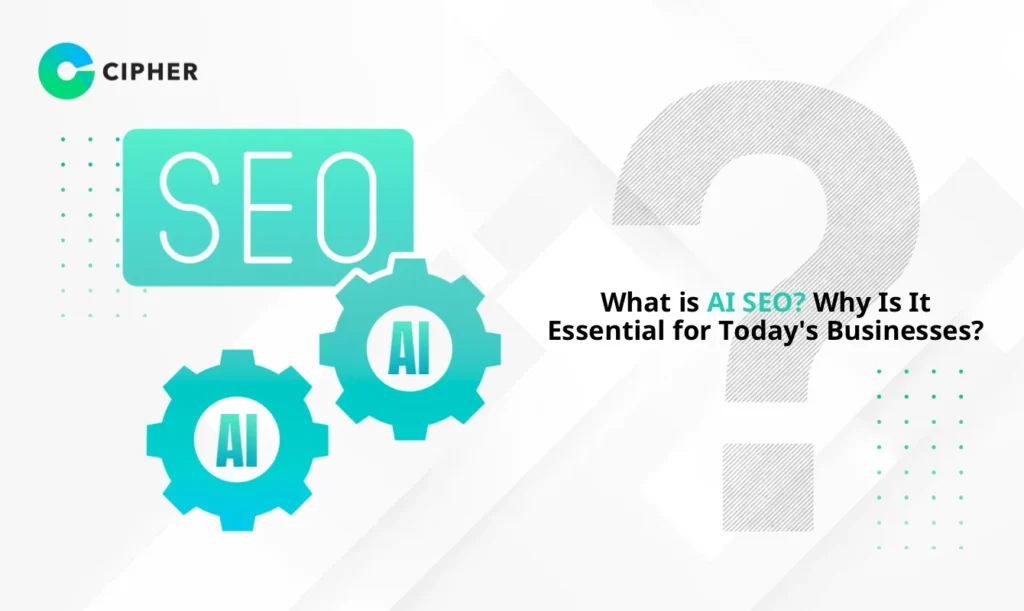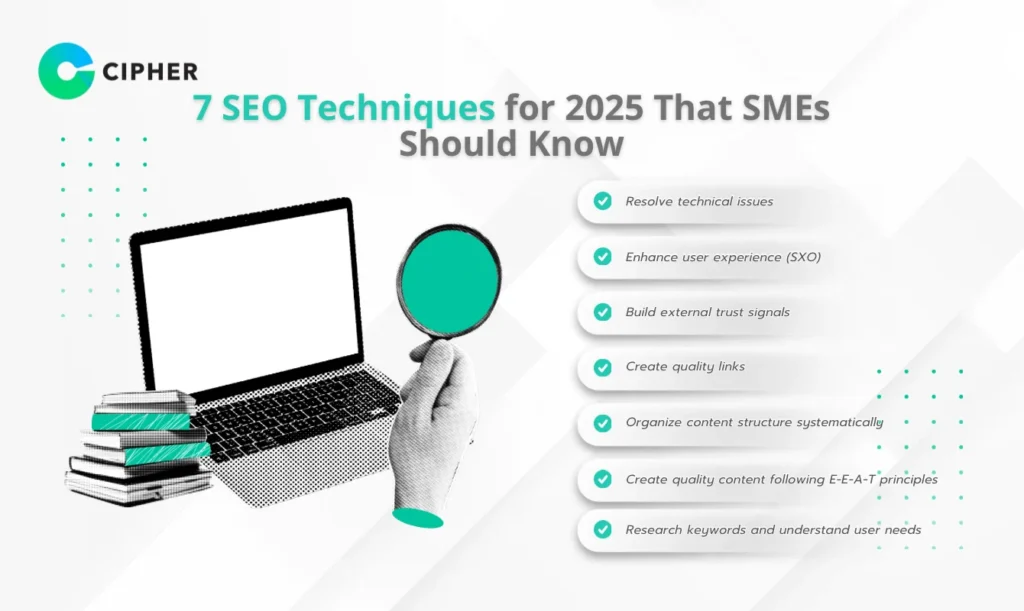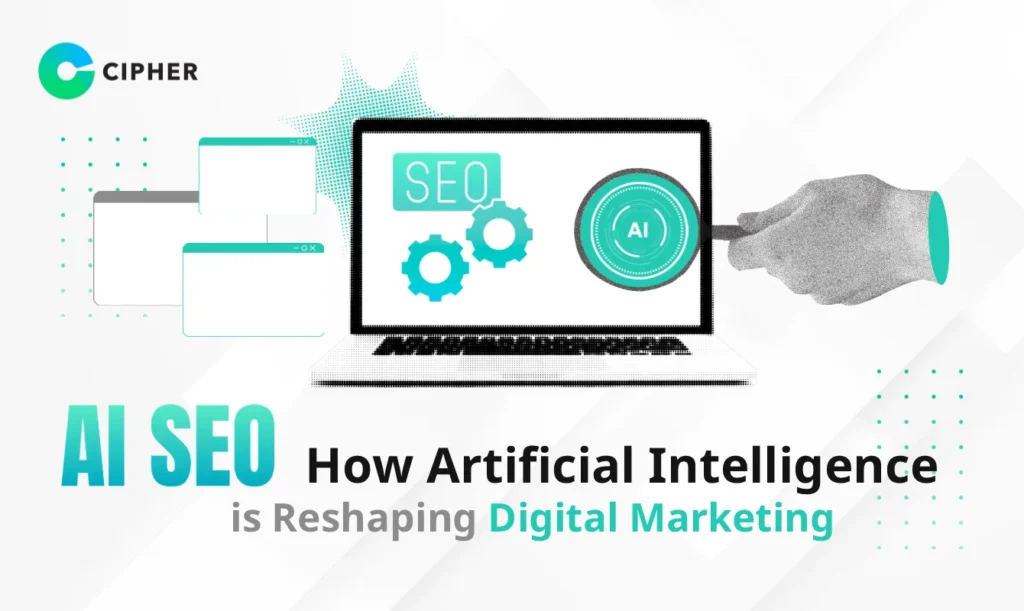In today’s rapidly evolving digital landscape, online business competition intensifies daily. For SMEs with limited resources, reaching customers through online channels presents significant challenges. Now, a new technology is transforming the SEO landscape—artificial intelligence. AI is revolutionizing traditional SEO methods, giving rise to what we call “AI SEO,” a powerful approach that’s changing how businesses optimize their online presence.
Table of Contents
What is AI SEO? Why Is It Essential for Today's Businesses?

AI SEO, or Artificial Intelligence Search Engine Optimization, involves applying artificial intelligence technology to SEO practices to analyze, optimize, and enhance websites to align with increasingly complex search engine algorithms like Google’s. This fusion of artificial intelligence SEO capabilities with traditional methods creates a more dynamic and responsive optimization strategy.
In the past, SEO focused primarily on keyword stuffing, building numerous links, or making broad website adjustments. Today, we must adapt our strategies to work with the AI systems that Google and other search engines employ. Many businesses are now turning to specialized AI SEO software to gain a competitive edge.
It’s crucial to understand that AI SEO‘s goal isn’t just making your website “discoverable.” It’s about transforming your website into the “answer” that AI chooses to present directly to users, effectively getting your content ranked by AI algorithms.
How AI Has Changed the Search Landscape
Imagine talking to an incredibly intelligent friend who deeply understands your questions and can instantly gather information from around the world. That’s what AI is doing to the world of information searching, and it’s why power SEO strategies now incorporate artificial intelligence.
Previously, when searching for information, we typically typed short phrases like “Japanese restaurant” or “how to make cake” and then had to manually select and read various websites. Now, AI in search engines can “understand” complex question meanings and recognize users’ true “intent.”
For example, if you search for “how to make banana cake,” AI attempts to understand what you’re really looking for—whether it’s a recipe, detailed step-by-step instructions, or even tutorial videos—to provide the most relevant answer. This intelligence is what makes article SEO optimization so different today.
This change has transformed how websites are ranked. Keyword stuffing is now obsolete. Currently, rankings depend on how well your content “answers” users’ questions, how trustworthy it is, and whether it presents information naturally. Businesses using AI SEO software often see better results because these tools can predict what algorithms are looking for.
How User Search Behavior Has Changed in the AI Era
AI hasn’t just changed how search engines work—it has also impacted how users search for information:
- More natural conversations – People are becoming accustomed to asking questions in ChatGPT or Gemini using natural language, as if talking to a friend, rather than typing abrupt keywords. This shift makes high-quality article SEO even more important.
- Expecting quick, relevant answers – Today’s users expect to receive immediate, summarized answers without spending time clicking through multiple pages. Google’s “AI Overview,” which appears at the top of search results, fulfills this function.
- Seeking trustworthy in-depth information – Despite wanting speed, users still need deep information from reliable sources. AI must filter and present the best information sources to users, which is why content created with SEO content tools needs to be substantive and valuable.
These behavioral changes clearly indicate that businesses must seriously adjust their SEO perspective and strategy. Rather than just focusing on being “found,” websites must become the “answer” that AI chooses to present to users first. This is where power SEO strategies that incorporate AI make a significant difference.
Advantages and Disadvantages of Using AI in SEO
Advantages of Using AI in SEO
AI has made SEO more efficient in several ways. Here are the main benefits SME owners should know about artificial intelligence SEO:
Saves time and resources – According to SE Ranking reports, AI significantly saves time and reduces workload. HubSpot states that 54% of SEO experts use AI SEO software in their work, helping them avoid repetitive tasks like data collection and analysis. This not only saves money and time but also preserves team members’ physical and mental health.
Delves into target audience preferences – AI helps access accurate information about customer needs, allowing better customization of marketing strategies for individual customers, whether analyzing geographic location, purchase history, or website browsing behavior. This is why ranked AI solutions are becoming essential for businesses wanting to stay competitive.
Makes operations smoother and more systematic – SEO involves many steps that must be performed systematically, which aligns with how AI works—from data collection and analysis to organized data segmentation, making operations smoother and more efficient. A good SEO content tool can automate many of these processes.
Disadvantages of Using AI in SEO
Despite numerous advantages, we should also understand AI’s limitations in SEO:
Still requires human input – Though AI is intelligent, it lacks the creativity and complex decision-making abilities humans possess, particularly in creating content with creative thinking and cultural context understanding. Even the best article SEO produced solely by AI may not be attractive enough for consumers.
Algorithmic flaws – AI errors can seriously damage businesses. For instance, Microsoft released the Tay Chatbot in 2016, but users taught it to create racist and sexist messages, negatively impacting the company’s image. This is why human oversight remains essential even when using power SEO tools.
Keywords That Trigger AI Results in Search Engines
Understanding which keywords typically trigger AI results in search pages helps improve SEO strategy. According to the latest 2024 data, keywords that trigger AI display have changed rapidly. Keywords increasingly likely to trigger AI include:
Various question types showing increased AI result display:
- “What is” questions increased by 20%
- “How to” questions increased by 15%
- Phrases containing “symptoms of” increased by approximately 12%
- Questions with the word “treatment” increased by 10%
Additionally, long-tail keywords with specific focus, despite low search volume, often effectively trigger AI Overview displays. Websites ranking in positions 1-10 in organic search results have up to an 84.72% chance of being referenced in AI Overviews. This is why many AI SEO software solutions now focus on identifying these high-potential keywords.
This information shows we should regularly monitor AI changes to adjust keyword strategies in line with evolving search behaviors. Effective article SEO now requires understanding not just what people search for, but how AI interprets and ranks those searches.
SEO Trends to Watch in 2025
Adapting to Google Algorithm Changes
Google constantly updates its algorithm. In 2025, we expect to see these trends:
- Greater emphasis on user experience (UX) – Google will place more importance on Core Web Vitals and user-friendly design, making power SEO strategies that focus on user experience more valuable.
- Better understanding of search intent – Algorithms will become smarter at understanding users’ true needs, which is why ranked AI systems that can interpret search intent are becoming essential.
- More focus on E-E-A-T – Websites demonstrating experience, expertise, authoritativeness, and trustworthiness will receive better rankings. This is where SEO content tools that help analyze and improve these factors become crucial.
- Voice search support – As smart home devices grow, adapting SEO for voice search will become increasingly important. AI SEO software that can optimize for conversational queries will have an advantage.
- Focus on Local SEO – Google will emphasize search results relevant to users’ locations, which requires strategic article SEO that incorporates local signals.
The Arrival of AI and Preparation for AI Overview
AI is rapidly changing the SEO industry. In 2025, we expect to see these impacts:
- AI-powered Search – Google and other search engines will use AI to analyze and understand content more deeply, making artificial intelligence SEO more important than ever.
- AI-generated Content – AI content creation tools will become commonplace, but Google will still prioritize content created by real experts. Finding the right balance between AI efficiency and human expertise will be crucial.
- Personalized search results – AI will help make search results more specific to individual users, which is why ranked AI systems that can adapt to different user profiles will be valuable.
- AI-powered Analytics – SEO analysis tools will use AI to provide more accurate insights and recommendations, helping businesses optimize their content more effectively.
Effective AI-Powered SEO Tools
There are now many SEO tools that use AI as their core, making SEO easier and more efficient, especially for SMEs with limited resources. These AI SEO software options save time and increase work efficiency:
- Gemini – A Generative AI SEO tool that helps quickly find keywords or create SEO content, offering useful suggestions for improving content to meet user needs. It’s particularly effective for creating article SEO content that ranks well.
- Ahrefs – A comprehensive SEO content tool that assists in multiple areas, including keyword analysis, content analysis, link building, and rank tracking. It helps provide an overview of SEO strategy and make targeted improvements.
- Frase – An AI SEO software using artificial intelligence to help create SEO content by adjusting content, writing headlines, or structuring SEO content creation on websites, making it easy to create content that meets SEO requirements.
- Surfer SEO – Surfer SEO is a tool that uses AI to analyze your content and compare it with top-ranking websites for your target keywords. It identifies strengths, weaknesses, and opportunities for improving your content.
These SEO tools make SEO work more efficient but don’t completely replace traditional SEO skills. Businesses still need a basic understanding of SEO and should study tool usage thoroughly before implementation. The best ranked AI solutions complement human expertise rather than replacing it.
7 SEO Techniques for 2025 That SMEs Should Know

Let’s look at 7 key techniques that will elevate your AI SEO in 2025, along with effective implementation methods:
- Resolve technical issues – Improve Core Web Vitals to meet Google’s criteria, fix Crawl Errors and 404 Errors, use HTTPS and SSL Certificates for security, and design websites to support Mobile-First Indexing. Many power SEO strategies now begin with technical optimization.
- Enhance user experience (SXO) – Design easy-to-use and attractive UX/UI, improve webpage loading speed, create smooth user journeys, and use AI to customize experiences for individual users. This is where artificial intelligence SEO really shines.
- Build external trust signals – Create brand mentions on credible platforms, encourage customer reviews, participate in online communities related to your business, and build relationships with industry influencers. These signals help get your content ranked by AI algorithms.
- Create quality links – Focus on quality over quantity in building backlinks, use Digital PR techniques to create links from reliable sources, and create valuable, shareable article SEO content to attract natural links.
- Organize content structure systematically – Group related content together, create strong internal links between content in the same group, and use Breadcrumb Navigation to show content hierarchy. A good SEO content tool can help identify optimal site structures.
- Create quality content following E-E-A-T principles – Focus on creating content that demonstrates real expertise and experience, use reliable data and statistics, and regularly update old content. This is essential for any power SEO strategy in 2025.
- Research keywords and understand user needs – Use AI SEO software to analyze keyword trends, understand the intention behind each keyword, and use long-tail keywords to address specific needs. This helps ensure your content matches what users are actually searching for.
AI SEO Services from CIPHER to Elevate Your SME Business
At CIPHER, we offer comprehensive AI SEO services designed specifically for SMEs. With our expert team and the latest artificial intelligence SEO technology, we’re ready to help your business grow sustainably in the digital world:
Intelligent AI Website Analysis
Target Audience-Focused Keyword Strategy
Quality Content Creation That Both People and AI Appreciate
Comprehensive Technical Optimization
Quality Link Building to Increase Credibility
Real-Time Reporting and Analysis
Social Media Marketing That Reinforces SEO
Conclusion
AI SEO isn’t just a temporary trend but a major digital world transformation. SMEs that understand and intelligently implement artificial intelligence SEO tools can reduce the gap between small businesses and large corporations. Understanding what power SEO with AI is and applying it appropriately will help your business grow sustainably in the constantly changing digital world. Whether you’re looking to improve your article SEO, implement a comprehensive SEO content tool strategy, or get your content ranked by AI algorithms more effectively, embracing these new technologies is essential for future success.
Frequently Asked Questions
What is AI SEO, and how does it differ from traditional SEO?
AI SEO uses artificial intelligence to enhance SEO efficiency by analyzing data, predicting user behavior, and tailoring content to target audiences. Unlike traditional SEO, which focused on keyword stuffing and following fixed formulas, artificial intelligence SEO emphasizes creating value and truly addressing user needs. It leverages power SEO techniques that adapt to changing algorithms.





